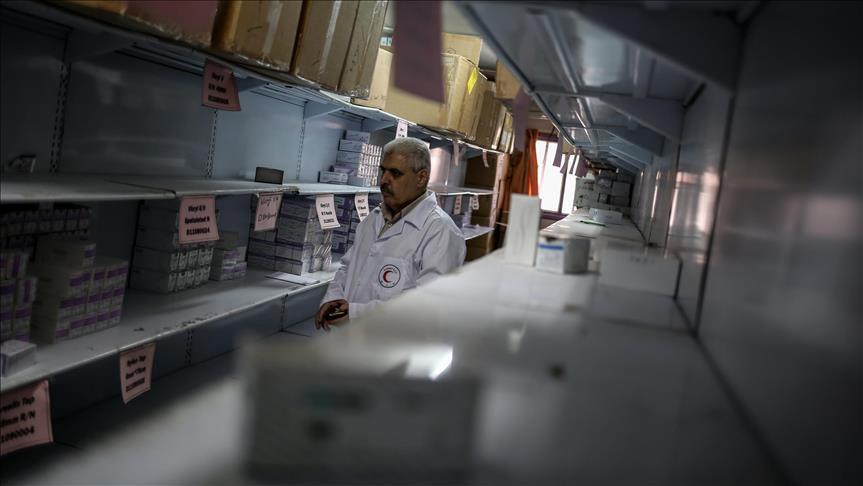
Ref: 92/2020
Date: 23 September 2020
Time: 10:00 GMT
The Palestinian Centre for Human Rights (PCHR) follows up with concern the acute shortage of essential drugs and medical supplies in the Gaza Strip, especially the lack of coronavirus (COVID-19) testing kites at the central laboratory of the Palestinian Ministry of Health (MOH). PCHR fears the collapse of the already fragile and exhausted health sector in Gaza due to the Israeli- imposed closure on the Gaza Strip for the last 14 years.
PCHR confirms that the shortage of medicines and medical supplies endangers the lives of thousands of patients and disrupts the provision of medical services for at least 2 million Palestinians who live in poor living conditions in the Gaza Strip, which is classified as the most overpopulated area in the whole world.
Dr. Ashraf al-Qedrah, MOH spokesperson in Gaza, said that MOH had reached a difficult phase due to the shortage of COVID-19 testing kites at its central laboratory, pointing out that the materials provided by the Qatar Committee for the Reconstruction of Gaza are expected to run out in the coming hours. Therefore, the laboratory’s capacity to perform COVID-19 testing will be cut by half.
Al-Qedrah stressed that if MOH were no longer able to run COVID-19 tests, this will negatively affect COVID-19 tracking efforts, as well as examining suspected cases and cases who had contact with confirmed ones, as well as the ad-hoc tests run across the Gaza governorates. This development would have serious repercussions for MOH’s efforts to curb the pandemic. Al-Qedrah added that the ministry suffers from a serious shortage of laboratory and blood banking supplies (65%), which will affect other laboratory tests necessary for coronavirus cases.
According to Gaza MOH, its central warehouses have acute and serious shortage of the essential drugs list; as the number of drugs categories at zero stock has reached 244 out of 516, with a 47.2% deficit rate, while the number of categories that are sufficient for less than 3 months has reached 69 (13.3%).
The following table shows the shortage of medicines distributed according to basic services provided by the MOH:
| List of Essential Medicines | Service | ||
| Items enough for less than 3 months | Zero Stock | Total Number | |
| 21 | 31 | 148 | Emergencies, surgeries, and ICU |
| 12 | 94 | 143 | Primary health care |
| 9 | 41 | 65 | Cancer and blood disorders |
| 8 | 23 | 41 | Mental health and nerves |
| 10 | 19 | 41 | Immunology, Epidemiology, and Genetic Diseases |
| 2 | 16 | 29 | Mother and child’s health |
| 5 | 9 | 22 | kidney failure and Hemodialysis |
| 2 | 9 | 18 | Ophthalmology |
| 0 | 2 | 9 | Radiology and Diagnostic Products |
| 69 | 244 | 516 | Total |
Moreover, the central warehouses have acute and serious shortage of the essential medical supplies list; as the number of categories at zero stock has reached 278 out of 853, with a 32.5% deficit rate, while the number of categories that are sufficient for less than 3 months has reached 69 (8%).
The following table shows the shortage of medical supplies distributed according to basic services provided by the MOH:
| Service | List of Medical Supplies | |||
| Total Number | Zero Items | Items enough for less than 3 months | ||
| Emergencies, surgeries, and ICU | 309 | 64 | 26 | |
| Cardiac catheterization and open-heart surgery | 194 | 132 | 16 | |
| Orthopedic surgery | 151 | 17 | 8 | |
| General tasks for all services | 90 | 14 | 10 | |
| Ophthalmology | 31 | 14 | 3 | |
| kidney failure and Hemodialysis | 23 | 7 | 5 | |
| Radiology and Diagnostic Products | 22 | 3 | 2 | |
| Dentistry | 21 | 12 | 0 | |
| colostomy surgery | 12 | 5 | 0 | |
| Total | 853 | 278 | 69 | |
According to MOH’s resources, the overall number of COVID-19 cases in the Gaza Strip is 2,518; 738 recovered, 1,763 active cases in the isolation hospital and 17 deaths.
The healthcare facilities in Gaza are already on the verge of collapse due to the Israeli- imposed closure on the Gaza Strip for the last 14 years, exacerbated by the repercussions of the Palestinian internal division and political bickering. All of this has caused a fragile healthcare system in the Gaza Strip, a perpetual shortage of essential drugs and medical devices and insufficient number of specialized health care professionals; rendering the system unable to meet the basic medical needs of the Gaza Strip population in normal times.
In light of the fear of a health sector collapse in the Gaza Strip and the inability of the healthcare system to deal with patients in the case of a wider coronavirus spread, PCHR: